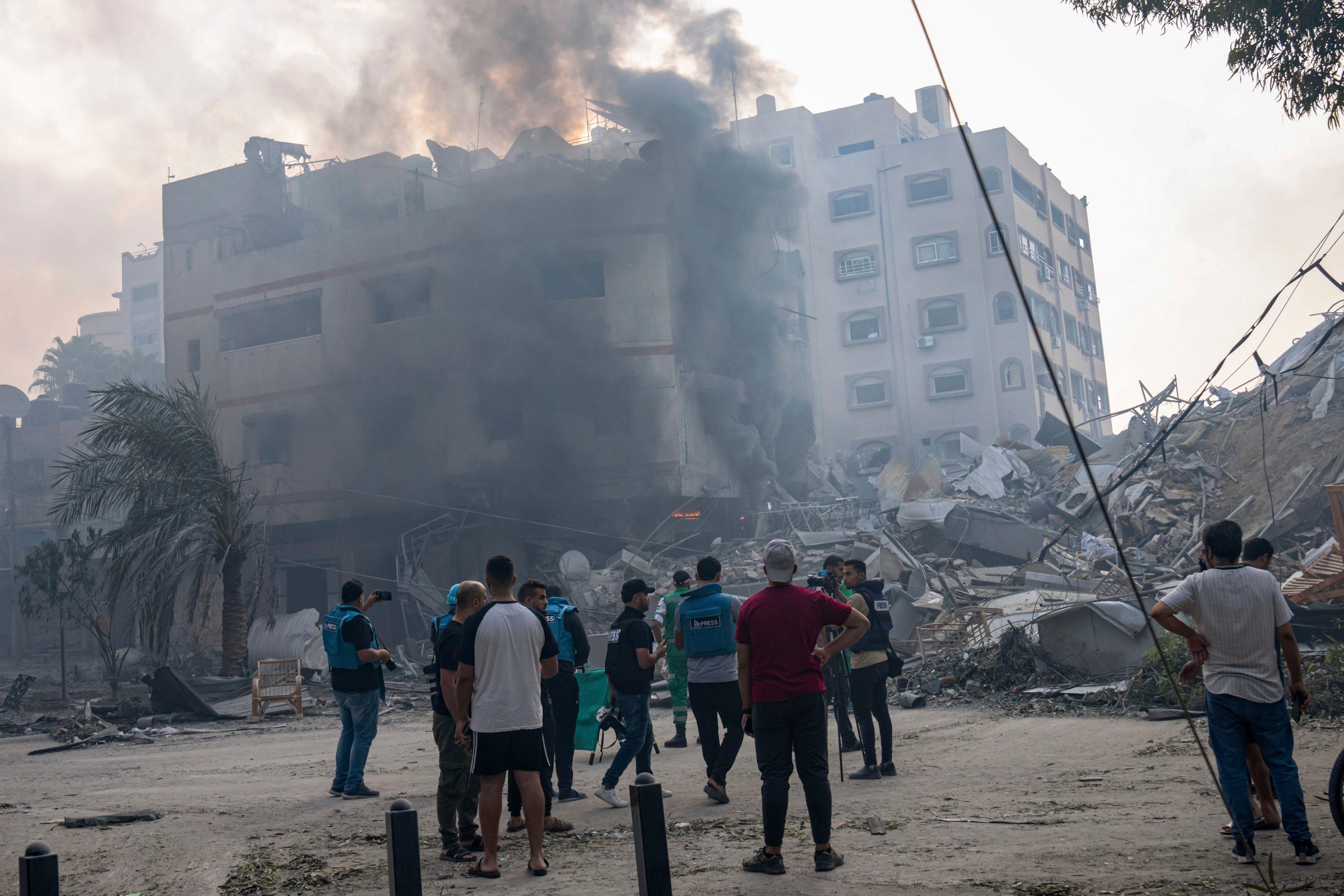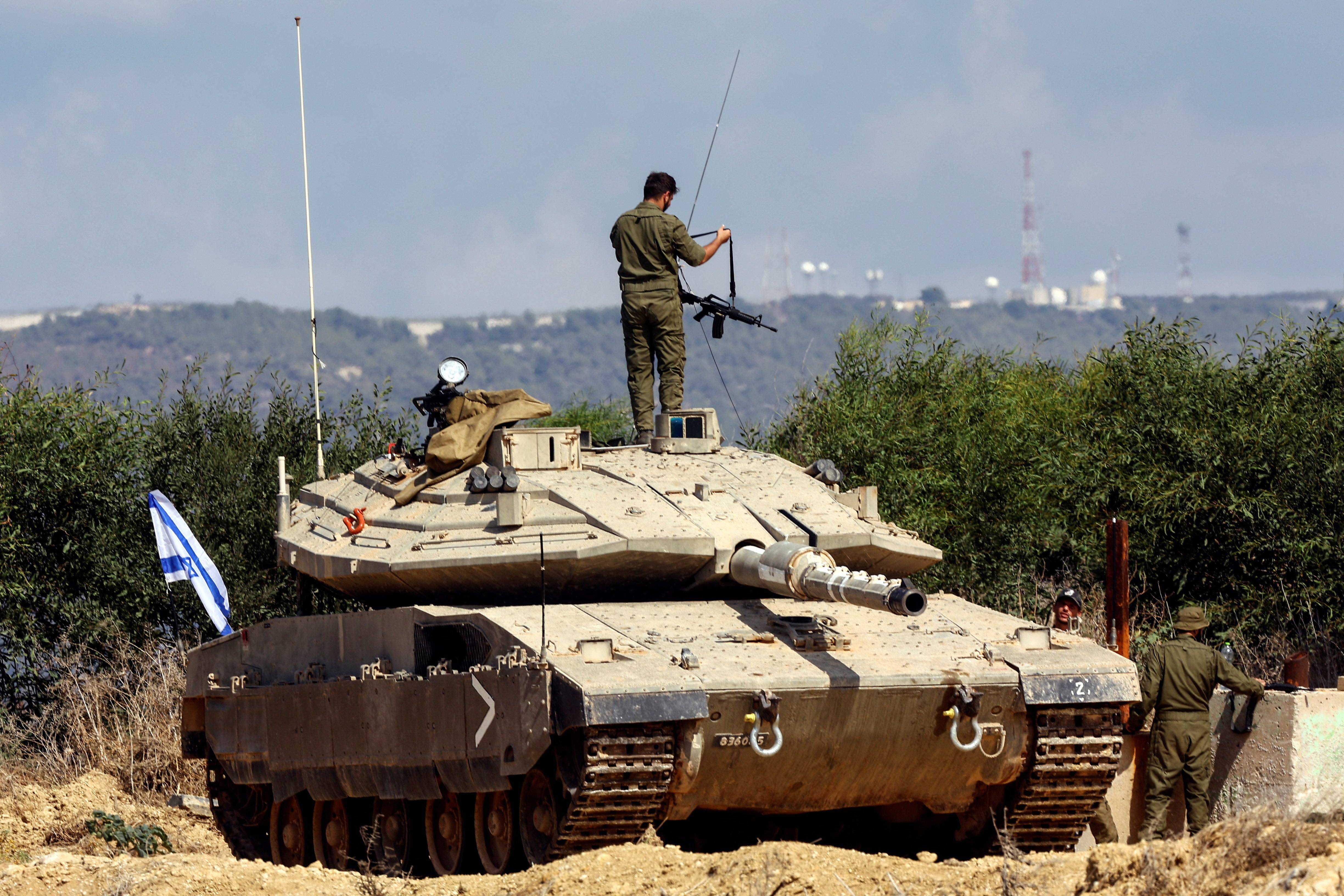Israeli troops wait for invasion order at Gaza border and ask: ‘If not now, when?’
Grieving relatives remain divided over what comes next – retaliation or diplomacy?
Your support helps us to tell the story
From reproductive rights to climate change to Big Tech, The Independent is on the ground when the story is developing. Whether it's investigating the financials of Elon Musk's pro-Trump PAC or producing our latest documentary, 'The A Word', which shines a light on the American women fighting for reproductive rights, we know how important it is to parse out the facts from the messaging.
At such a critical moment in US history, we need reporters on the ground. Your donation allows us to keep sending journalists to speak to both sides of the story.
The Independent is trusted by Americans across the entire political spectrum. And unlike many other quality news outlets, we choose not to lock Americans out of our reporting and analysis with paywalls. We believe quality journalism should be available to everyone, paid for by those who can afford it.
Your support makes all the difference.Merkava tanks are lined up in the desert. Low-flying Apache and Cobra helicopter gunships swirl up plumes of sand and dust that settle on turrets pointed squarely at the border. Troops are also settled in a pattern of briefings and combat drills – all while patiently waiting for that paramount order.
Almost two weeks after the Hamas carnage which resulted in 1,400 deaths and 200 hostages being seized, Israel’s declaration that the war will be taken to Gaza – by land, air and sea – remains just that. The question privately asked among soldiers and officers: “If not now, when?”
Grim reminders persist of what happened when Hamas carried out its lethal attack, catching the Israeli military off-guard in its biggest intelligence failure since the Yom Kippur War a half-century ago.
Two bodies were found on Thursday during searches in the Ba’eri Kibbutz, one of first places to be hit during the raid. They were of a young boy and a woman. Identification will take some time such was the state of their charred bodies. At least 108 people were slaughtered in the kibbutz, around 10 per cent of the population.
Bereaved families want justice and for many this means their country’s forces going into Gaza, hunting down the killers and destroying their bases.

Yosef Mizrachi, whose 22-year-old nephew Daniel was among the 260 who died at the Supernova music festival near Reim Kibbutz, has no doubt about what needs to be done.
“Daniel was a son to me, we helped bring him up. His parents, my brother and sister-in-law, died when he was young. How do you think I feel about the people who murdered him and all the others?
“Will Hamas give them up to stand trial here or in an international court? No, of course not, they’ll have to be found in Gaza in the tunnels they are hiding in and dealt with.”
Yosef’s wife Nora added: “We have had rocket attacks from Gaza over many years. Now we have this massacre – people beheaded, burned. This cannot happen again. It is time to end this once and for all. And the only way would be for our soldiers to go to Gaza”.

But then there are also the views of those whose relations and friends were abducted. They fear a full-scale military assault would lead to these helpless captives being used as human shields who will die in the crossfire.
Many of them are bitter about the failures by Benjamin Netanyahu’s government which led to the attacks. They remain deeply worried that there are politicians who may be prepared to sacrifice the hostages when military action takes place.
These exhausted families and their friends gather outside the military headquarters waving the national flag and chanting, “bring them home”.
Siblings Maya and Itay Regev are among those missing after also going to the Supernova festival. The last time their father Ilan heard his daughter’s voice was in a phone call. “They shot us, we are going to be dead, they shot us,” she screamed down the line, her voice consumed with fear.
Later in the day, a Hamas video surfaced on social media showing the brother and sister tied up on the back of a pickup truck.
“It was very distressing to see them like that, really bad. But at least they’re alive. That is the main thing,” Ilan said.
Ilan and his wife Mirat believe every possible means must be explored before the military option is taken. “There must be a diplomatic solution. We need to get the help of the diplomatic community, our neighbouring countries”, said Mirit. “We are talking about risks to many, many lives here.”
There are foreign nationals being held hostage – including American and British – along with Israelis. Mr Netanyahu’s government is facing strong pressure from these countries to continue with talks to get them out. The issue was raised by President Biden when he was here on Wednesday and was again raised by Rishi Sunak during his visit today.
One possible avenue is a deal wrapped into a wider agreement on aid getting into Gaza. The Qataris are believed to be the interlocutors in this.

But the hostages are just one of the factors the Israeli government must consider before sending in the tanks. This is going to be a massive and complicated operation. Hamas has around 40,000 well-armed fighters in its military wing – the Izz ad-Din al-Qassam Brigades. Another 80,000 in the civic administration could also be called to arms.
Those of us who covered the 2014 Gaza war from inside Gaza know that Israeli infantry suffered serious losses from booby traps, anti-tank mines and snipers. One reason Israel demanded the evacuation of the civilian population of the northern half of Gaza is to sweep the area. This, however, is believed to be going slower than expected.
The Israeli forces also have to cope with hundreds of miles of tunnels in Gaza. Many of the hostages, it is believed, are being kept there. Clearing these passageways is essential to achieving tactical success.
Much of the fighting will take place in this subterranean arena. And, after the monumental intelligence failure on the Hamas attack, security chiefs want to be certain that they have all the information necessary on the layout of the sprawling underground network.
There are also serious logistical difficulties being faced with 360,000 reservists to be assimilated into the ranks. This would be a big task for any country, but especially so for Israel, which has a relatively small standing military.

Robert Emerson, a British security expert, who has analysed the previous Gaza Wars, said: “People forget that the longest one, 2014, wasn’t easy for the Israelis and this time Hamas is much better prepared and have been planning this for a while, the corollary is that Israel wasn’t prepared for what happened.
“International opinion will not allow Israel to fight a long war with mounting civilian deaths. They must get this right, do it as fast as possible, not get bogged down in months of kinetic action.”
It is not just the Gaza front where focus is needed. Iran has been loudly denouncing Israel and warning of an “axis of resistance” on “multiple fronts” for the Jewish state if it invades Gaza.
As well as backing Hamas, Tehran supports Hezbollah in Lebanon. There have been incursions by gunmen into Israel from Lebanon. Troops are being sent there and defences bolstered. Israel cannot rule out fighting a war on two fronts, one of them with a formidable enemy in Hezbollah with its huge stocks of missiles and rock-solid supply lines from Iran.
There are also the geopolitical factors. US officials are said to have been surprised by the scale of protests in Arab countries against America for its support for Israeli air strikes. Chants of “Death to America” have been heard at marches and protests across the Middle East, including Bahrain a close ally of the US.
There is no evidence the US is opposing a ground war in Gaza, although President Biden has warned that any Israeli return to an occupation of Gaza would be “a big mistake”.
American officials have asked the Israeli military to review some of their plans to try to ensure civilian casualties are limited where they can be. US officers who took part in bloody urban combat in Fallujah in 2004 during the Iraq War are said to have arrived to brief their Israeli counterparts on lessons learned.
Israeli commanders privately say that they have had to see off attempts by some members of the Netanyahu cabinet to invade Gaza in the days after the Hamas massacre. There was no need for this, they say. Hamas has been boxed in with the draconian siege being enforced. Through this, Israel has the space to fight at a time of its choosing.
The military want to point out that they have not been inactive. Hamas weapon caches and defensive fortifications are being hit in air and missile strikes and commando raids. The group’s leadership is being denuded in targeted killings. The latest to die was Jehad Mheisen, the chief of its national security force, on Thursday.
Some of the Israeli soldiers at their battle stations in the south, most of them fresh young reservists, say they find the lingering wait before the advance unnerving. Older heads counsel patience and point out that better preparations will ensure more of them get to come home from this brutal war.


Join our commenting forum
Join thought-provoking conversations, follow other Independent readers and see their replies
Comments